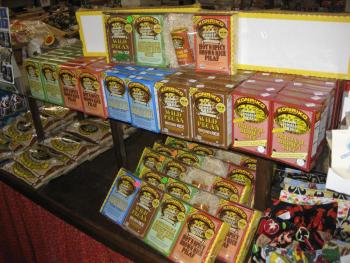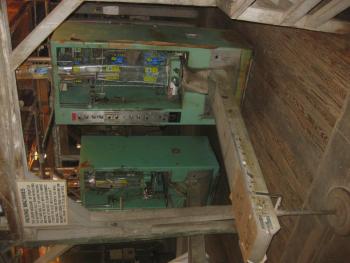
The different varieties of KONRIKO rice that is produced at the historic Conrad Rice Mill is seen on a shelf inside the KONRIKO Brand Company Store, located next door to the mill in downtown New Iberia.
(Gazette photo by Raymond Partsch III)

The bag sealing machines or packaging machines are seen on the ground floor of the Conrad Rice Mill in New Iberia. (Gazette photo by Raymond Partsch III)
LA. UP CLOSE: History is brought to a boil at Conrad Rice Mill
By: RAYMOND PARTSCH III
Managing Editor
Louisiana is known worldwide for its delicious culinary dishes, in particular the ones that have its roots in the southern part of the Bayou State.
There is chicken and sausage gumbo, seafood gumbo, jambalaya, crawfish etouffee, fricassee, smothered chicken, meatball stew and shrimp and egg stew. All of those savory dishes have one crucial ingredient in common, a key component that helps bring the meal together --- rice.
The grain first appeared in Louisiana in the early 1700’s and became a staple in the cuisine of the state during both Spanish and French rule. Ever since then rice has remained an integral part of Louisiana cuisine and culture, and nowhere is that more evident than at the Conrad Rice Mill in New Iberia, which is the oldest continuous rice mill in the United States.
“This is my life’s work,” said owner Mike Davis, whose mill produces an average of five to six million pounds of rice per year. “I came here when I was 29 and now I am 70.”
P.A. Conrad founded the Conrad Rice Mill and Planting Company in 1912 and cut the rice by hand that he grew and then let the grain sun-dry before threshing it. Eventually Conrad expanded his business to where he bought rice from other growers in the region to meet the growing demands of the general public.
The original part of the mill, which is built three feet off the ground to avoid flooding issues, was constructed in 1914 with wood planks from Louisiana Cypress trees and additions were later added in 1917 and then again in 1930.
In the 1950’s, Conrad came up with the name of his rice product “KONRIKO” which is an acronym of “Conrad Rice Company,” with the C’s turned to K’s for trademark purposes. The elder Conrad left the business to his sons who ran it until selling it to former teacher-farmer and current owner Davis in the late 1970’s.
The mill that visitors can tour today is very much the way it was nearly a hundred years ago, except that the mill today is powered by electricity and not a large steam engine.
The three-story building covered in tin metal and with steel plates on the floors has no air conditioning as the afternoon breeze does just fine to help cool off the mill workers. Those workers still use equipment that is in some cases nearly a hundred years old.
Bags of rice are pushed around on push carts made of cypress and steel that are original to the mill. The paddy machine (which is part of the cleaning process) was purchased in 1927 from a German manufacturer that is no longer in business. The newest piece of large mill equipment is the bag sealing machine which is from the 1970’s.
“You can produce products and do so by taking shortcuts ,but that is not the right way of doing things,” Davis said. “It’s not what people expect from this company. If you have pride in what you do then you don’t take shortcuts.”
Added tour guide Wendy Guyolte, “We could upgrade the equipment but we don’t want to. We want to preserve our history.”
That level of pride even applies to minor things such as still putting stencils on their own bags instead of printed labels.
“We joke around here that our printer never breaks down,” Guyolte added. “We just hire another person.”
In addition to touring the historic mill, visitors have the chance to visit the KONRIKO Brand Company Store, which was constructed in the 1980’s next door to the mill as a replica general-plantation store. This is where the tour actually begins. In there visitors can purchase Mardi Gras items, hand-crafted items by Houma Indians, a slew of the company’s own seasonings and of course their brand of rice, including the very popular Wild Pecan Brown Rice.
After tasting a sample of freshly steamed rice, the tour begins with visitors sitting in a church pew in the general store to watch a 15-minute slideshow presentation on the history of Acadiana, including images familiar to Evangeline Parish residents like Mamou Mardi Gras and the Louisiana Tournoi.
A tour guide then explains the history of rice harvesting in the region (including the process of flooding the fields and the germination of the grain), how short grain rice is preferred in Asia compared to long grain in most of the United States (the exception being Cajun country which prefers medium grain), the milling process at Conrad from shelling to grading to packaging the rice at the landmark.
The mill, which was placed on the National Register of Historic Places in 1981, and store have only a 15-person staff, that does not include the cats that roam the mill as rodent control. Despite a small staff the mill still manages to produce 50 varieties of rice and seasonings while hosting roughly 50,000 visitors per year, from all over the world including Europe and New Zealand.
KONRIKO is at the forefront of the healthy ingredient or clean food movement, where products are wheat and gluten free. In addition to its rice and seasonings, the company produces a gravy thickener that uses rice to replace corn starch and bread crumbs that are made from rice.
“Mike always says if you can’t say or spell it then don’t eat it,” Guyolte said.
“We are a niche market rice mill,” said Davis, who is currently working on developing a curry rice. “We are the only operation in the state that is kosher and gluten free. We pride ourselves on that.”
So where is the nation’s oldest rice mill headed?
“We are trying to take these natural products into the food service side of the business. Not restaurants but the health care facilities, nursing homes and assisted living centers. We see the health care business growing as the fastest section of the food service industry. That’s where we are headed towards.”
- Log in to post comments

